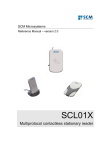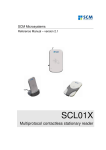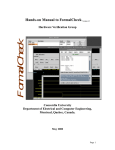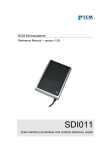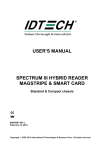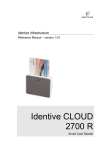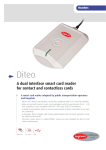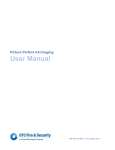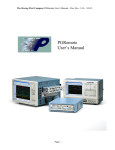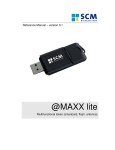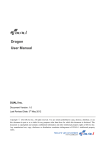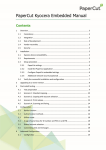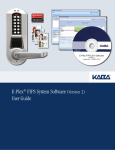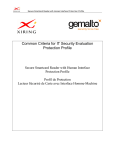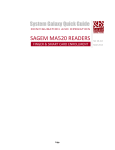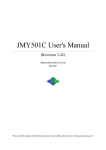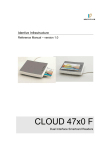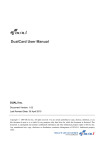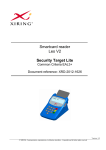Download SCL3711 - SCM Microsystems
Transcript
SCM Microsystems Reference Manual – version 1.5 SCL3711 Multiprotocol contactless mobile reader Reference manual SCL3711 Multiprotocol Contactless mobile Reader © SCM Microsystems Oskar-Messter-Strasse, 13 85737 Ismaning Germany Phone +49 89 9595 5000 • Fax +49 89 9595 5555 Document history Date Version Description of change 16/02/2009 1.0 Initial version 06/03/2009 1.1 Review and update by product management 18/03/2009 1.2 Final review for release 01/04/2009 1.3 Update – added examples of APDU sequences for a few commands + corrected a few typos 01/04/2009 1.4 Updates related to Driver version 1.04 29/10/2009 1.5 Updates related to Driver version 1.06 • Various editorial changes • Installation procedure chapter updated • Addition of T=CL user command description (§6.1.3) • Addition of FELICA_PASSTHROUGH escape (§6.6.10) Contact information http://www.scmmicro.com/products-services/smart-card-readers-terminals/contactless-dualinterface-readers.html For sales information, please email [email protected] Table of Contents 1. Legal information ............................................................................................................... 7 1.1. Disclaimers..................................................................................................................... 7 1.2. Licenses ......................................................................................................................... 7 1.3. Trademarks .................................................................................................................... 7 2. Introduction to the manual ................................................................................................. 8 2.1. Objective of the manual ................................................................................................. 8 2.2. Target audience ............................................................................................................. 8 2.3. Product version corresponding to the manual ............................................................... 8 2.4. Definition of various terms and acronyms...................................................................... 9 2.5. References ................................................................................................................... 10 2.6. Conventions ................................................................................................................. 11 3. General information about SCL3711 ............................................................................... 12 3.1. SCL3711 key benefits .................................................................................................. 12 3.2. SCL3711 key features.................................................................................................. 12 3.3. SCL3711 ordering information ..................................................................................... 13 3.4. SCL3711 customization options................................................................................... 13 3.5. Contactless communication principles and SCL3711 usage recommendations ......... 14 3.5.1. Power supply......................................................................................................... 14 3.5.2. Data exchange ...................................................................................................... 14 3.5.3. Recommendations ................................................................................................ 15 3.6. Applications .................................................................................................................. 16 3.6.1. 3.6.2. 4. General ................................................................................................................. 16 Applications provided by SCM Microsystems....................................................... 16 SCL3711 characteristics.................................................................................................. 17 4.1. SCL3711 high level architecture .................................................................................. 17 4.1.1. Block diagram ....................................................................................................... 17 4.1.2. Software architecture ............................................................................................ 17 4.2. Quick reference data .................................................................................................... 18 4.2.1. 4.2.2. 4.2.3. 5. SCL3711 dimensions............................................................................................ 18 LED behavior ........................................................................................................ 18 Other data ............................................................................................................. 18 Software modules ............................................................................................................ 20 5.1. Installation .................................................................................................................... 20 5.1.1. Command line parameters for installation ............................................................ 21 5.1.2. Command line parameters for un-installation. ...................................................... 21 5.2. Utilities.......................................................................................................................... 21 5.3. Driver ............................................................................................................................ 22 5.3.1. SCL3711 listing..................................................................................................... 22 5.3.2. Supported operating systems ............................................................................... 22 5.3.3. PC/SC 2.0 compliant ATR .................................................................................... 23 5.4. Firmware ...................................................................................................................... 28 5.4.1. 5.4.2. 6. Transport protocol ................................................................................................. 28 Automatic PPS ...................................................................................................... 28 Commands description .................................................................................................... 29 6.1. Generic APDUs ............................................................................................................ 29 6.1.1. Get UID Command ............................................................................................... 29 6.1.2. Get DATA Command ............................................................................................ 30 6.1.3. T=CL user Command............................................................................................ 31 6.1.4. PASS_THROUGH command ............................................................................... 32 6.2. Set of APDU for contactless storage user tokens........................................................ 33 6.2.1. STORAGE_CARD_CMDS_READ_BINARY ........................................................ 33 6.2.2. STORAGE_CARD_CMDS_WRITE_BINARY ...................................................... 35 6.2.3. STORAGE_CARD_CMDS_LOAD_KEYS ............................................................ 37 6.2.4. STORAGE_CARD_CMDS_AUTHENTICATE...................................................... 38 6.2.5. STORAGE_CARD_CMDS_VALUE_BLOCK ....................................................... 40 6.3. Set of APDU for ISO/IEC 14443-4 user tokens ........................................................... 41 6.3.1. T=CL Command.................................................................................................... 41 6.4. MIFARE DESFire commands ...................................................................................... 42 6.5. Set of APDU defined by SCM Microsystems ............................................................... 42 6.5.1. Commands for communicating with NFC Forum Tags Type 1............................. 42 6.5.2. Commands for communicating with NFC Forum Tags Type 2............................. 48 6.5.3. Commands for communication with NFC Forum Tags Type 3............................. 48 6.5.4. Commands for communicating with NFC Forum Tags Type 4............................. 50 6.6. Escape IOCTL’s supported in SCL3711 ...................................................................... 51 6.6.1. 6.6.2. 6.6.3. 6.6.4. 6.6.5. 6.6.6. 6.6.7. 6.6.8. 6.6.9. 6.6.10. 7. READER_CNTLESS_GET_ATS_ATQB .............................................................. 51 READER_GET_CARD_TYPE_POLLING ............................................................ 52 READER_CNTLESS_SET_TYPE ........................................................................ 52 READER_CNTLESS_RF_SWITCH ..................................................................... 53 READER_ CNTLESS_DISABLE_PPS................................................................. 53 READER_ENABLE_DISABLE_848 ..................................................................... 54 READER_CNTLESS_BAUDRATE....................................................................... 54 READER_FORCE_BAUDRATE........................................................................... 55 READER_DISABLE_NAK_POLLING................................................................... 56 FELICA_PASSTHROUGH.................................................................................... 56 Annexes ........................................................................................................................... 57 7.1. Annex A........................................................................................................................ 57 7.1.1. Status words table ................................................................................................ 57 7.1.2. Further information about PC/SC.......................................................................... 57 7.2. Annex B – Mechanical drawings .................................................................................. 58 SCL3711 REFERENCE MANUAL 1. Legal information 1.1. Disclaimers The content published in this document is believed to be accurate. SCM Microsystems does not, however, provide any representation or warranty regarding the accuracy or completeness of its content and regarding the consequences of the use of information contained herein. If this document has the status “Draft”, its content is still under internal review and yet to be formally validated. SCM Microsystems reserves the right to change the content of this document without prior notice. The content of this document supersedes the content of previous versions of the same document. The document may contain application descriptions and/or source code examples, which are for illustrative purposes only. SCM Microsystems gives no representation or warranty that such descriptions or examples are suitable for the application that the reader may want to use them for. Should you notice problems with the provided documentation, please provide your feedback to [email protected]. 1.2. Licenses If the document contains source code examples, they are provided for illustrative purposes only and subject to the following restrictions: • You MAY at your own risk use or modify the source code provided in the document in applications you may develop. You MAY distribute those applications ONLY in form of compiled applications. • You MAY NOT copy or distribute parts of or the entire source code without prior written consent from SCM Microsystems. • You MAY NOT combine or distribute the source code provided with Open Source Software or with software developed using Open Source Software in a manner that subjects the source code or any portion thereof to any license obligations of such Open Source Software. If the document contains technical drawings related to SCM Microsystems products, they are provided for documentation purposes only. SCM Microsystems does not grant you any license to its designs. 1.3. Trademarks MIFARE is a registered trademark of NXP Semiconductors BV. FeliCa is a registered trademark of Sony Corporation. Jewel and Topaz are trademarks of Innovision Research and Technology Plc. Windows is a registered trademark of Microsoft Corporation 7 SCL3711 REFERENCE MANUAL 2. Introduction to the manual 2.1. Objective of the manual This manual provides an overview of the hardware and software features of the SCL3711 multiprotocol mobile contactless reader, hereafter referred to as “SCL3711”. This manual describes in details interfaces and supported commands available for developers using SCL3711 in their applications. 2.2. Target audience This document describes the technical implementation of SCL3711. The manual targets software developers. It assumes knowledge about 13.56 MHz contactless technologies like ISO/IEC 14443 and commonly used engineering terms. Should you have questions, you may send them to [email protected] . 2.3. Product version corresponding to the manual Item Version Hardware 0.2 Firmware 2.7.0 Driver 1.06 Installer 1.04 8 SCL3711 REFERENCE MANUAL 2.4. 9 Definition of various terms and acronyms Term Expansion APDU ATR ATS Byte CCID CID CL CLA DFU FeliCa™ Application Protocol Data Unit Answer to Reset, defined in ISO7816 Answer to Select, defined in ISO14443 Group of 8 bits Chip Card Interface Device Card Identifier Contactless Class byte defined in ISO 7816 Device Firmware Upgrade Sony contactless technology standardized in ISO18092, technology underlying the NFC Forum tag type 3 Instruction byte defined in ISO7816 Innovision contactless technology, technology underlying the NFC Forum tag type 1 Light emitting diode The ISO14443 Type A with extensions for security (NXP) Not applicable Node Address NFC Data Exchange Format: data structure defined by the NFC Forum for NFC Forum tags. Near Field Communication Group of 4 bits. 1 digit of the hexadecimal representation of a byte. Example: 0xA3 is represented in binary as (10100011)b. The least significant nibble is 0x3 or (0011)b and the most significant nibble is 0xA or (1010)b Peer – to – Peer Proximity Coupling Device Personal Computer/Smart Card: software interface to communicate between a PC and a smart card Proximity Integrated Chip Card Product ID Protocol Parameter Selection Distance coverage till ~10 cm. Pseudo unique PICC identifier Reserved for future use Radio Frequency Smart card reader controller ASIC from SCM Microsystems Status word defined in ISO7816 Universal Serial Bus Vendor ID Binary notation of a number x, y, z ∈{0,1} The byte value YY is represented in hexadecimal INS Jewel/Topaz LED MIFARE NA NAD NDEF NFC Nibble P2P PCD PC/SC PICC PID PPS Proximity PUPI RFU RF STC3 SW1 SW2 USB VID (xyz)b 0xYY SCL3711 REFERENCE MANUAL 2.5. 10 References Doc ref in the manual Description Issuer ISO/IEC 7816-4 Identification cards - Integrated circuit(s) cards with contacts Part 4: Interindustry commands for interchange ISO/IEC 7816-4: 1995 (E) Identification cards — Contactless integrated circuit(s) cards — Proximity cards Part 4: Transmission protocol ISO/IEC 144434:2001(E) Information technology — Telecommunications and information exchange between systems — Near Field Communication — Interface and Protocol (NFCIP-1) ISO/IEC 18092:2004(E) NFCForum-TS-Type-1-Tag_1.0 ISO / IEC NFC Forum NFCForum-TS-Type-2-Tag_1.0 NFC Forum NFCForum-TS-Type-3-Tag_1.0 NFC Forum NFCForum-TS-Type-4-Tag_1.0 NFC Forum Interoperability Specification for ICCs and Personal Computer Systems v2.01 User manual of the NFC wrapper. This manual is part of SCM’s Contactless SDK. Specification for Integrated Circuit(s) Cards Interface Devices 1.1 Universal Serial Bus Specification 2.0 PC/SC Workgroup ISO/IEC 14443-4 ISO/IEC 18092 NFC Forum tag type 1 NFC Forum tag type 2 NFC Forum tag type 3 NFC Forum tag type 4 PC/SC NFC wrapper CCID USB ISO / IEC ISO / IEC SCM Microsystems USB-IF USB-IF SCL3711 REFERENCE MANUAL 2.6. Conventions Bits are represented by lower case ‘b’ where followed by a numbering digit. Bytes are represented by upper case ‘B’ where followed by a numbering digit. Example: 163 in decimal is represented • in hexadecimal as 0xA3 • in binary as (10100011)b The least significant nibble of 0xA3 is • 0x3 in hexadecimal • (0011)b in binary The most significant nibble of =xA3 is • 0xA in hexadecimal • (1010)b in binary 11 SCL3711 REFERENCE MANUAL 12 3. General information about SCL3711 3.1. SCL3711 key benefits With its functional solid mechanical design that has no removable parts that you may loose, SCL3711 is perfect for mobile uses. While being slim, SCL3711 dimensions have been optimized to ensure best RF performance possible with such a form factor. The state of the art multi-protocol feature set of SCL3711 qualifies it to be used in a wide range of applications such as payment, loyalty and ID schemes, or to enable devices with NFC connectivity. As a latest generation product, SCL3711 can be supported by SCM’s middleware that resides above the PC/SC API and offers better portability of applications and abstraction of smart card related details that need to be handled by applications developed on top of the PC/SC API. 3.2. SCL3711 key features • • Multi-protocol 13.56MHz contactless reader: o ISO14443 type A & B o MIFARE (Classic, DESFire, UL, UL-C, MIFARE PLUS) o FeliCa™ o NFC Peer-to-peer communication will be available through driver upgrade PC/SC v2.0 compliant SCL3711 REFERENCE MANUAL 3.3. SCL3711 ordering information Item Part number SCL3711 905108 Contactless SDK 905124 3.4. 13 SCL3711 customization options Upon request, SCM can customize: • The color of the casing • The logo • The product label • The USB strings Terms and conditions apply, please contact your local SCM representative or send an email to [email protected]. SCL3711 REFERENCE MANUAL 14 3.5. Contactless communication principles and SCL3711 usage recommendations 1 SCL3711 is a contactless reader designed to communicate with user tokens. User tokens 2 User tokens are made of a contactless integrated circuit card connected to an antenna Credit card sized smart card • Key fob • NFC mobile phone etc… 1 71 L3 • SC User tokens can take several form factors: Communication between SCL3711 and user tokens uses magnetic field inductive coupling. The magnetic field generated by SCL3711 has a carrier frequency of 13.56MHz. 3.5.1. Power supply When the user token is put in the magnetic field of the reader, its antenna couples with the reader and an induction current appears in the antenna thus providing power to the integrated circuit. The generated current is proportional to the magnetic flux going through the antenna of the user token. 3.5.2. Data exchange The carrier frequency of the magnetic field is used as a fundamental clock signal for the communication between the reader and the card. It is also use as a fundamental clock input for the integrated circuit microprocessor to function. To send data to the user token the reader modulates the amplitude of the field. There are several amplitude modulation and data encoding rules defined in ISO/IEC 14443 and ISO/IEC 18092. The reader should refer to those standards for further details. To answer to the reader, the integrated circuit card of the user token modulates its way of loading (impedance) the field generated by the reader. Here also further details can be found in ISO/IEC 14443 and ISO/IEC 18092. 1 In the ISO/IEC 14443 standard, the reader is called the proximity coupling device (PCD) 2 In the ISO/IEC 14443 standard, the user token is called proximity integrated chip card (PICC) SCL3711 REFERENCE MANUAL 15 3.5.3. Recommendations The communication between the reader and the user token is sensitive to the presence of material or objects interfering with the magnetic field generated by the reader. The presence of conductive materials like metal in the vicinity of the reader and the user token can severally degrade the communication and even make it impossible. The magnetic field of the reader generates Eddy or Foucault’s currents in the conductive materials; the field is literally absorbed by that kind of material. It is recommended for proper communication to avoid putting SCL3711 in close proximity of conductive materials. The presence of multiple user tokens in the field also interferes with the communication. When several user tokens are in the field of the reader, load of the field increases which implies that less energy is available for each of them and that the system is detuned. For this reason, SCM Microsystems has implemented in its driver the support for 1 slot only. It is recommended to present only one user credential at a time in front of SCL3711. The communication between the reader and the user token is sensitive to the geometry of the system {reader, user token}. Parameters like the geometry and specially the relative size of the reader and user token antennas directly influence the inductive coupling and therefore the communication. SCL3711 was primarily designed and optimized to function with user credentials of various technologies having the size of a credit card. It may happen that SCL3711 is not capable of communicating with extremely large or extremely small antennas. In order to optimize the coupling between the reader and the user token, it is recommended to put both antennas as parallel as possible In order to optimize transaction speed between the reader and the card it is recommended to place the user token as close as possible to the reader. This will increase the amount of energy supplied to the user credential which will then be able to use its microprocessor at higher speeds SCL3711 REFERENCE MANUAL 3.6. 16 Applications 3.6.1. General SCL3711 is a transparent reader designed to interface a personal computer host supporting PC/SC interface with 13.56MHz user tokens like public transport cards, contactless banking cards, NFC forum tags, electronic identification documents – e.g. e-passports, e-ID cards, driving licenses etc. Those user tokens can have several form factors like credit cards, key fobs, NFC mobile phones or USB dongles like SCT3511 or @MAXX Lite that SCM Microsystems markets. SC L3 71 1 SCL3711 itself handles the communication protocol but not the application related to the token. The application-specific logic has to be implemented by software developers on the host. 3.6.2. Applications provided by SCM Microsystems SCM Microsystems does not provide payment or transport applications. SCM Microsystems provides a few applications for development and evaluation purposes that can function with SCL3711. They are available within the software development kit. There are many tools provided but the two main ones are: • The NFC forum tag reader/writer is a standalone application that enables the user to read and write NFC forum compliant records into NFC forum compatible tags. It is an easy to use tool to configure rapidly NFC forum tag demonstrations. • Smart card commander version 1.1 provides a module which for NFC forum tags that parses and presents in XML format the content of the tag. Smart card commander also contains powerful scripting functionality which can be very useful for developers to develop and debug their applications. SCL3711 REFERENCE MANUAL 17 4. SCL3711 characteristics 4.1. SCL3711 high level architecture 4.1.1. Block diagram The link between SCL3711 and the host to which it is connected is the USB interface providing both the power and the communication channel. SCL3711 is based designed around an NFC controller which handles the USB communication to the host and the RF communication. This controller ensures the coding/decoding/framing modulation/demodulation required for the RF communication. The matching circuitry provides the transmission and receiver paths adaptation for the antenna to function properly. 4.1.2. Software architecture Applications can interface with the driver directly through the PC/SC interface or through the SCM proprietary interface to the NFC wrapper. The NFC wrapper simplifies the usage of the different NFC Forum tags with the SCL3711 and other SCM contactless readers. It provides a unique API to application developers, which enables them to read and modify NDEF records without further knowledge of the underlying hardware and protocols. Detailed information about the NFC wrapper can be found in SCM’s Contactless SDK. Application SCM API (for P2P and extra services) SCM’s NFC wrapper PC/SC v2.0 API (ADPU from ISO/IEC 7816-4 and SCM defined) Driver Firmware The SCL3711 driver implements PC/SC v2.0 API towards upper layers. The SCL3711 driver for Windows platforms is based on the Windows Driver Framework (WDF) version 1.09. SCL3711 REFERENCE MANUAL 4.2. 18 Quick reference data 4.2.1. SCL3711 dimensions Item Characteristic Value Weight External dimensions(mm) Cable length Default color Default logo 10.2 Grams 65.4(L) x 24(W) x 10 (H) NA BLACK Textured Finish SCM logo SCL3711 Default label Drawing with dimensions of the SCL3711 and accessories can be found in annex. 4.2.2. LED behavior The LED behavior of the SCL3711 is given below. SCL3711 states LED Indication (GREEN) After plug-in (no driver loaded) Driver successfully loaded User token arriving in the field User token removed from the field Suspend/hibernate/shutdown state SCL3711 disabled OFF ON One blink ON, no specific visual indication OFF OFF 4.2.3. Other data Parameter Value/Description DC characteristics Low bus powered (SCL3711 draws power from USB bus) Voltage: 5V Max Current : 100mA Suspend current : 260uA Clock of the device controller RF carrier frequency Modulation Unloaded field strength USB specification Max 27.12MHz 13.56 MHz +/- 50 ppm As defined in ISO/IEC 14443 1.5 A/m to 2.2 A/m ( Un-modulated RF on reader casing) USB 2.0 FS Devise SCL3711 REFERENCE MANUAL USB Speed Device Class PID VID API ID1 format tokens supported Maximum baud rate Multiple PICC in field Operating temperature range Operating humidity range Storage condition range Certifications 19 Full Speed Device (12Mbit/s) Vendor 0x5591 0x04E6 PC/SC 2.0 NFC forum tag type 1 through SCM-specific APDU NFC forum tag type 2 through PC/SC-defined APDUs NFC forum tag type 3 through SCM-specific APDU NFC forum tag type 4 through PC/SC APDUs ISO/IEC 14443-4 PICC type A and type B 3 MIFARE (Classic, DESFire, Ultralight, Ultralight C, MIFARE PLUS ) Non-Secure FeliCa™ 848 Kbps Not supported -20°C – +70°C Up to 95%RH non condensing -40°C – + 85°C USB CE FCC VCCI WEEE RoHS WHQL UL Radio Frequency for Japan 3 MIFARE PLUS cards in security level 2, ISO14443-3 commands are not supported because the SAK byte of those user tokens doesn’t indicate it is supported SCL3711 REFERENCE MANUAL 20 5. Software modules SCL3711 is provided with an installer. 5.1. Installation Make sure the SCL3711 is not plugged in your PC before you start. Start the installer by double clicking on setup.exe instructions Click Next on the welcome page of the installer Read the license agreement. You have to accept it in order to be able to install the driver. Then install and then follow the wizard SCL3711 REFERENCE MANUAL 21 After a few minutes, you are notified the installation happened correctly The installer will then prompt you to insert your SCL3711 to update the memory settings. You are ready to use your SCL3711 In some very rare cases, you may be asked to reboot your PC. Please do so if this is the case. 5.1.1. Command line parameters for installation A few parameters of the installer can be configured when launching the installer from the command line Silent mode of installation Setup.exe /s /v“/qn” Installation with no dialogs Setup.exe /v”LIMITUI=1” No reboot dialog Setup.exe /v”REBOOTREQD=0” 5.1.2. Command line parameters for un-installation. A few parameters of the installer can be configured when launching the installer from the command line Silent mode of un-installation <system folder>\Msiexec.exe /x<path to msi file>\<msi file name> /qn De-installation with no dialogs <system folder>\Msiexec.exe /x<path to msi file>\<msi file name> LIMITUI=1 No reboot dialog <system folder>\Msiexec.exe /x<path to msi file>\<msi file name> REBOOTREQD=0 5.2. NA Utilities SCL3711 REFERENCE MANUAL 5.3. 22 Driver The driver for Windows platforms is based on Microsoft WDF architecture 1.09. The driver package contains INF, SYS, CAT and the co-installer DLL required for the WDF architecture. 5.3.1. SCL3711 listing SCL3711 enumerates as SCL3711-NFC&RW After the driver is installed, SCL3711 appears in Windows resource manager as SCL3711 reader & NFC device: SCL3711 is listed by PC/SC applications as SCM Microsystems Inc. SCL3711 reader & NFC device N. Where N=0 if only one SCL3711 is connected but is incremented in case several SCL3711 are connected to the host. 5.3.2. Supported operating systems Operating systems supported by the driver: • Windows 2000 SP4 • Windows 2003 Server (32 & 64 bit) • Windows XP (32 & 64 bit) • Windows Vista (32 & 64 bit) • Windows Server 2008 (32 & 64 bit) • Linux (32 & 64 bit) • MACOSX SCL3711 REFERENCE MANUAL 23 5.3.3. PC/SC 2.0 compliant ATR 5.3.3.1. Determining the technology of the user credential The ScardControl method of PC/SC (see http://msdn.microsoft.com/enus/library/aa379474(VS.85).aspx) should be used to send the 0x90 IOCTL to SCL3711 in order to determine what type of technology is the user token based on. The output buffer is a BYTE with the following meaning: Technology Value MIFARE1K 0x01 MIFARE4K 0x02 MIFARE Ultralight and Ultralight C 0x03 ISO14443-4A 0x04 FeliCa 0x05 Topaz 0x06 ISO14443-4B 0x07 Once a user credential is selected the driver constructs an ATR from the fixed elements that identify the token. Depending on the user technology this ATR can be analyzed as described hereunder. SCL3711 REFERENCE MANUAL 5.3.3.2. 24 ATR for type A memory user tokens The ATR of the user token is composed as described in the table below. In order to allow the application to identify the storage card properly, it’s Standard and Card name describing bytes must be interpreted according to the Part 3 Supplemental Document, maintained by PC/SC. Byte# Value Designation 0 0x3B Initial header 1 0x8n T0 2 0x80 TD1 Description n indicates the number of historical bytes in following ATR Nibble8 indicates no TA2, TB2, TC2 Nibble 0 means T=0 3 0x01 TD2 Nibble8 indicates no TA3, TB3, TC3 Nibble 1 means T=1 4...3+n 0x80 0x4F Lentgh 4+n A status indicator may be present in an optional TLV data object Optional TLV data object Tag: Application identifier 1 byte RID Registered identifier on 5 bytes PIX Proprietary identifier extension on 3 bytes 0x00 0x00 0x00 0x00 4 RFU bytes 0x91 TCK XOR of all previous bytes Example of the ATR built for a MIFARE Classic 4K card: SCL3711 REFERENCE MANUAL 5.3.3.3. 25 ATR for an NFC Forum tag type 1 user token (Topaz) Byte# Value Designation Description 0 0x3B Initial header 1 0x82 T0 TD1 present. 2 historical bytes in following ATR 2 0x80 TD1 Nibble8 indicates no TA2, TB2, TC2 and TD2 present Nibble 0 means T=0 3 0x01 TD2 Nibble8 indicates no TA3, TB3, TC3 Nibble 1 means T=1 4 0x02 Card Mode NFC TAG operating at Passive 106 baud rate 5 0x44 Card Type Card type is Topaz 6 0xXX TCK XOR of all previous bytes Example of the ATR built for a Topaz tag: SCL3711 REFERENCE MANUAL 5.3.3.4. 26 ATR for a NFC Forum tag type 3 user token (FeliCa) Byte# Value Designation Description 0 0x3B Initial header 1 0x8C T0 TD1 present. following ATR 2 0x80 TD1 Nibble8 indicates no TA2, TB2, TC2 and TD2 present 12 historical bytes in Nibble 0 means T=0 3 0x01 TD2 Nibble8 indicates no TA3, TB3, TC3 Nibble 1 means T=1 4 0x04 Card Mode NFC TAG operating at Passive 212 baud rate 5 0x43 Card Type Card type is Felica 6 0xFD IFS Maximum frame size of felica card 7-14 - ID Felica card Identifier – 8 bytes 15 0xXX Timeout Write Timeout indicated by card 16 0xXX TCK XOR of all previous bytes Example of the ATR built for a FeliCa user token: SCL3711 REFERENCE MANUAL 5.3.3.5. 27 ATR for ISO/IEC 14443-4 user tokens The user token exposes its ATS or application information which is mapped to an ATR. The table describes how this mapping is done. Byte# Value Designation Description 0 0x3B Initial header 1 0x8n T0 n indicates the number of historical bytes in following ATR 2 0x80 TD1 Nibble8 indicates no TA2, TB2, TC2 3 0x01 TD2 Nibble8 indicates no TA3, TB3, TC3 Nibble 0 means T=0 Nibble 1 means T=1 4...3+n 4+n Historical bytes or application information TCK Type A: the historical bytes from the ATS (up to 15 bytes) Type B (8 bytes): • Byte 0 through 3: application data from ATQB, • Byte 4 through 6: protocol info byte from ATQB, • Byte 7: higest nibble is the MBLI (maximum buffer length index) from ATTRIB, lowest nibble is 0x0 XOR of all previous bytes Example of the ATR built for an ISO14443-4 user tokens: Type A Type B SCL3711 REFERENCE MANUAL 5.4. 28 Firmware 5.4.1. Transport protocol SCL3711 implements a transport protocol which is proprietary to NXP Semiconductors. 5.4.2. Automatic PPS Automatic PPS implemented is implemented. SCL3711 will automatically switch the highest baud rate commonly supported by the SCL3711 and the user token The maximum speed supported by SCL3711 is 848Kbps by default. SCL3711 REFERENCE MANUAL 29 6. Commands description 6.1. Generic APDUs 6.1.1. Get UID Command 6.1.1.1. Description This command will retrieve the UID or SNR or PUPI of the user token. This command can be used for all supported contactless technologies. 6.1.1.2. Format CLA INS P1 P2 Lc Data in Le 0xFF 0xCA 0x00 0x00 - - XX Setting Le = 0x00 can be used to request the full UID or PUPI is sent back • For ISO14443A possible lengths are 4, 7 or 10 • For ISO14443B possible length is 4 bytes PUPI • For FeliCa™ or NFC Forum type 3 tags possible length is 12 bytes of NFCID • For NFC Forum type 1 tags possible length is 7 bytes of UID 6.1.1.3. Response Data Out Data + SW1 + SW2 6.1.1.4. Status Words SW1 SW2 Description 0x90 0x00 NO ERROR 0x62 0x82 WARNING: specified Le is greater than data to be retrieved 0x6C 0xXX ERROR: Wrong Length. 0xXX is the exact value for Le Further error codes can be found in annex SCL3711 REFERENCE MANUAL 30 6.1.2. Get DATA Command 6.1.2.1. Description This command can be used to retrieve the ATS of an ISO/IEC14443-4A user token only. 6.1.2.2. Format CLA INS P1 P2 Lc 0xFF 0xCA 0x01 0x00 0x00 6.1.2.3. Response Data Out ATS + SW1 + SW2 6.1.2.4. Status Words SW1 SW2 Description 0x90 0x00 NO ERROR 0x6A 0x81 Command not supported SCL3711 REFERENCE MANUAL 31 6.1.3. T=CL user Command 6.1.3.1. Description This command can be used to send raw data to the user token. SCL3711 will add T=CL protocol data to the raw data you send. Formatted: Bullets and Numbering 6.1.3.2. Format CLA INS P1 P2 P3 Data 0xFF 0xFE 0x00 0x00 Lraw_data Raw_data Formatted: Bullets and Numbering 6.1.3.3. Response Data Out PICC response data+ SW1 + SW2 Formatted: Bullets and Numbering 6.1.3.4. SW1 SW2 Status Words Description User should refer to the status words defined by the PICC manufacturer for a description of the status words Formatted: Bullets and Numbering 6.1.3.5. Example Let’s consider the Select command defined in ISO7816-4. This command being ISO can be sent to the user token in 2 different way: • Using the T=CL command • Using the T=CL user command Here are the 2 answers for the select command: The T=CL command is nevertheless more useful for sending commands which are not defined in ISO7816. SCL3711 REFERENCE MANUAL 32 6.1.4. PASS_THROUGH command 6.1.4.1. Description This command can be used to send raw data to the user token. SCL3711 will not add transport protocol data to the raw data – e.g. PCB, NAD, CID etc. Formatted: Bullets and Numbering 6.1.4.2. Format CLA INS P1 P2 P3 Data 0xFF 0xEF 0x00 0x00 Lraw_data Raw_data Formatted: Bullets and Numbering 6.1.4.3. Response Output buffer PICC response data Formatted: Bullets and Numbering 6.1.4.4. Status Words NA Formatted: Bullets and Numbering 6.1.4.5. Example This command can be used to send commands to a MIFARE Ultralight C The command for generating an 8-byte random number on MIFARE Ultralight C is 0x1A 0x00: Sending the APDU 0xFF 0xEF 0x00 0x00 0x02 0x1A 0x00 Will return 0xAF followed by 8 byte random number SCL3711 REFERENCE MANUAL 6.2. 33 Set of APDU for contactless storage user tokens Command specific return codes are given under each command. Please refer section 7.1.1 (Status words table) for common return codes. 6.2.1. STORAGE_CARD_CMDS_READ_BINARY 6.2.1.1. Description Using this APDU, application can read a memory block on user tokens based on technologies like MIFARE Classic 1K or 4K (block size 0x10 bytes) or MIFARE Ultra light (block size 0x04 bytes). 6.2.1.2. Format CLA INS P1 P2 Le 0xFF 0xB0 0x00 Block # 0xXX Where: • P2 indicates the block number from where to read • Le can be a short (maximum value 255) or extended (maximum value 65535). If Le=0x00, then all the bytes until the end of the file are read within the limit of 256 for a short Le field and 65536 for an extended Le field. 6.2.1.3. Response Data Out Data + SW1 + SW2 6.2.1.4. Status Words SW1 SW2 Description 0x90 0x00 NO ERROR 0x69 0x82 Security status not satisfied 0x64 0x00 State of non volatile memory unchanged SCL3711 REFERENCE MANUAL 6.2.1.5. 34 Example For a MIFARE Classic 1K card which has the following memory content: To read the seventh block, you have to issue the following command and get the following response: SCL3711 REFERENCE MANUAL 35 6.2.2. STORAGE_CARD_CMDS_WRITE_BINARY 6.2.2.1. Description This APDU writes data pattern in to a memory address 6.2.2.2. Format CLA INS P1 P2 Lc Data in 0xFF 0xD6 0x00 Block # 0xXX Data Where: • P2 indicate the memory block number where data should be written • Lc=0x10 for MIFARE Classic 1K/4K. Lc=0x04 for MIFARE Ultralight 6.2.2.3. Response Data Out SW1 + SW2 6.2.2.4. Status Words SW1 SW2 Description 0x90 0x00 NO ERROR 0x69 0x82 Security status not satisfied 0x64 0x00 State of non volatile memory unchanged SCL3711 REFERENCE MANUAL 6.2.2.5. Example For a MIFARE Classic 1K card which has the following memory content: Issuing the command Will have the following effect on the memory content 36 SCL3711 REFERENCE MANUAL 37 6.2.3. STORAGE_CARD_CMDS_LOAD_KEYS 6.2.3.1. Description Some type of user tokens like MIFARE Classic may require that the an authentication happens before any data can be read or written. To encrypt perform this authentication, keys need to be loaded in the reader’s memory using this command. 6.2.3.2. Format CLA INS P1 P2 Lc Data in 0xFF 0x82 0x00 Key Type Key Length Key value Where P2 can have the following values (please refer to MIFARE documentation from NXP for further details on what is key A and Key B): • 0x60 to use the Key A • 0x61 to use the Key B 6.2.3.3. Response Data Out SW1 + SW2 6.2.3.4. Status Words SW1 SW2 Description 0x90 0x00 NO ERROR 0x69 0x83 Reader key not supported 0x85 Secured transmission not supported 0x87 Non volatile memory not available 0x88 Key number not valid 0x89 Key length not correct SCL3711 REFERENCE MANUAL 38 6.2.4. STORAGE_CARD_CMDS_AUTHENTICATE 6.2.4.1. Description This command enables to perform authentication for user tokens based on MIFARE Classic 1K or 4K. Before this command can be successfully executed, the STORAGE_CARD_CMDS_LOAD_KEY command must have been executed. 6.2.4.2. Format CLA INS P1 P2 Lc Data in 0xFF 0x86 0x00 0x00 0x05 Data Where the data field is structured as follow Byte # Value Description B0 0x01 Version B1 Address MSB B2 Address LSB B3 0x60 Key A 0x61 Key B B4 Number of the key to be used for authentication Information about memory structure of MIFARE Classic must be requested from NXP Semiconductors. 6.2.4.3. Response Data Out SW1 + SW2 6.2.4.4. SW1 SW2 Status Words Description 0x90 0x00 NO ERROR 0x63 0x00 WARNING no further info 0x69 0x82 Security status not satisfied 0x84 Referenced key not usable 0x86 Key type not known SCL3711 REFERENCE MANUAL 6.2.4.5. 39 Example For a MIFARE Classic 1K card which has the following memory mapping: Authenticating with Key A against sector 0 would require sending the following sequence of APDU Authenticating with Key A against sector 1 or 2 would require sending the following sequence of APDU SCL3711 REFERENCE MANUAL 40 6.2.5. STORAGE_CARD_CMDS_VALUE_BLOCK 6.2.5.1. Description This APDU is used to interact with MIFARE Classic e-purse applications. Please refer to MIFARE Classic documentation available from NXP Semiconductors for further details on MIFARE classic memory mapping and commands. 6.2.5.2. Format CLA INS P1 P2 Lc Data in 0xFF 0xF0 0x00 Block # Lc Increment/Decrement, Block number, Value Where P1, P2 code the address of the block number addressed Where the data field is structured as follow Byte # Value Description B0 0xC0 Increment 0xC1 Decrement B1 Block number B2-B5 Value (LSB first) 6.2.5.3. Response Data Out SW1 + SW2 6.2.5.4. Status Words SW1 SW2 Description 0x90 0x00 NO ERROR 0x69 0x82 Security status not satisfied 6.2.5.5. Example CLA INS P1 P2 Lc Data in 0xFF 0xF0 0x00 0x1E 0x06 0xC0 0x1E 0x01 0x00 0x00 0x00 Will increment block number 0x1E of a MIFARE Classic-based user token by a value of 0x01. SCL3711 REFERENCE MANUAL 6.3. 41 Set of APDU for ISO/IEC 14443-4 user tokens 6.3.1. T=CL Command 6.3.1.1. Description Using this command, SCL3711 transfers directly ISO/IEC7816-4 APDU to the user token. 6.3.1.2. CLA INS Format P1 P2 P3 Data Description of the APDU commands can be found in ISO/IEC 7816-4 specification. 6.3.1.3. Response Data Out PICC answer + SW1 + SW2 As defined in ISO/IEC 7816-4. 6.3.1.4. SW1 Status Words SW2 Description See ISO/IEC 7816-4 As defined in ISO/IEC 7816-4. 6.3.1.5. Example The following APDU sequence reads the first 256 bytes of the data group 1 as specified in ICAO LDS (logical data structure) for machine readable travel documents with open access. It first selects the issuer application using its AID (0xA0 0x00 0x00 0x02 0x47 0x10 0x01), then selects the DG1 file (0x01 0x01) and then does a read binary. SCL3711 REFERENCE MANUAL 6.4. 42 MIFARE DESFire commands MIFARE DESFire native commands can be mapped onto case 4 APDU as described hereunder: CLA INS P1 P2 P3 Data Le 0x90 DESFire cmd code 0x00 0x00 Length of data field DESFire command parameters 0x00 The response from a DESFire user token will be mapped as follow Data SW1 SW2 User token answer 0x91 0xYY 0xYY is the DESFire native status byte as described in NXP documentation. Note: In the past SCM Microsystems had its own proprietary APDU for handling DESFire cards that was implemented on SCL010 and SDI010 products. It is still supported but SCM recommends to use this mapping method for any new development. 6.5. Set of APDU defined by SCM Microsystems 6.5.1. Commands for communicating with NFC Forum Tags Type 1 Commands for Static and Dynamic Memory Models • Read Identification (RID) • Read All Blocks 0 – Eh (RALL) • Read Byte (READ) Commands for Dynamic Memory Model • Read Segment (RSEG) • Read 8 Bytes (READ8) • Write-No-Erase 8 Bytes (WRITE-NE8) 6.5.1.1. Read Identification (RID) Description This command is used to retrieve the tag’s unique identifier. Format CLA INS P1 P2 P3 Data 0xFF 0x50 0x00 0x00 0x00 - Response Data SW1 SW2 HR0 HR1 UID0 UID1 UID2 UID3 0x90 0x00 SCL3711 REFERENCE MANUAL 6.5.1.2. 43 Read All Blocks (RALL) Description The RALL command reads-out the two header ROM bytes and the whole of the static memory blocks 0x0-0xE. Format CLA INS P1 P2 P3 Data 0xFF 0x52 0x00 0x00 0x00 - Response Data SW1 SW2 HR0 HR1 120 bytes (Blocks 0x0 – 0xE) 0x90 0x00 Example For a Topaz-based user token that has the following memory content The following APDU sequence can be used to retrieve the identifier and read all the blocks SCL3711 REFERENCE MANUAL 6.5.1.3. 44 Read Byte (READ) Description This command reads a single EEPROM memory byte within the static memory model area of blocks 0x0-0xE. Format CLA INS P1 P2 P3 Data 0xFF 0x54 0x00 Byte Address 0x00 - Where P2 is coded as follow Bit # Value Description b0 – b2 Byte number to be addressed(value between 0x0 and 0x7) b3 – b6 Block number (value between 0x0 and 0xE) b7 (0)b Number of the key to be used for authentication Response Data SW1 SW2 1 byte of data 0x90 0x00 6.5.1.4. Write-Erase Byte (WRITE-E) Description This commands erases and then writes the value of an individual memory byte within the static memory model area of blocks 0x0-0xE. Format CLA INS P1 P2 P3 Data 0xFF 0x56 0x00 Byte Address 0x01 1 byte of data to be written Where P2 is coded as follow Bit # Value Description b0 – b2 Byte number to be addressed(value between 0x0 and 0x7) b3 – b6 Block number (value between 0x0 and 0xE) b7 (0)b Number of the key to be used for authentication Response Data SW1 SW2 Byte value that has been written 0x90 0x00 SCL3711 REFERENCE MANUAL 6.5.1.5. 45 Write-No-Erase Byte (WRITE-NE) Description This command writes a byte value on an individual memory byte within the static memory model area of blocks 0x0-0xE. This command does not erase the value of the targeted byte before writing the new data. Execution time of this command by NFC Forum tags type 1, is approximately half that of the normal write command (WRITE-E). Using this command, EEPROM bits can be set but not reset. Format CLA INS P1 P2 P3 Data 0xFF 0x58 0x00 Byte Address 0x01 1 byte of data to be written Where P2 is coded as follow Bit # Value Description b0 – b2 Byte number to be addressed(value between 0x0 and 0x7) b3 – b6 Block number (value between 0x0 and 0xE) b7 (0)b Number of the key to be used for authentication Response Data SW1 SW2 Value of the memory byte after execution 0x90 0x00 Example Sending the following command to an NFC Forum type 1 tag that has the value 0x39 in the first EEPROM byte of block 0x1 of its static memory model area CLA INS P1 P2 P3 Data 0xFF 0x58 0x00 0x10 0x01 0xA8 Will give the answer Data SW1 SW2 0xB9 0x90 0x00 0x39=(00111001)b 0xA8=(10101000)b 0xB9=(10111001)b SCL3711 REFERENCE MANUAL 6.5.1.6. 46 Read Segment (RSEG) Description This command reads out a complete segment of memory. Format CLA INS P1 P2 P3 Data 0xFF 0x5A 0x00 Segment Address 0x00 - Where P2 is coded as follow Bit # Value Description b0 – b3 (0000)b RFU b4 – b7 Segment address (value between 0x0 and 0xF) Response Data SW1 SW2 128 bytes of data 0x90 0x00 6.5.1.7. Read 8 bytes (READ8) Description This command reads out a block of memory. Format CLA INS P1 P2 P3 Data 0xFF 0x5C 0x00 Block Address 0x00 - P2 – Block Address - b8 - b1 - General block (0x00 -0xFF) Response Data SW1 SW2 8 bytes of data 0x90 0x00 SCL3711 REFERENCE MANUAL 6.5.1.8. 47 Write-Erase 8 bytes (WRITE-E8) Description This command erases a memory block and then writes a value to it. Format CLA INS P1 P2 P3 Data 0xFF 0x5E 0x00 Block Address 0x08 8 bytes of data to be written Where P2 codes the block address (value between 0x00 and 0xFF) Response Data SW1 SW2 8 bytes of data that have been written 0x90 0x00 6.5.1.9. Write-No-Erase 8 bytes (WRITE-NE8) Description This command writes with no erase to a block of memory. This command does not erase the value of the targeted block before writing the new data. Using this command, EEPROM bits can be set but not reset. Format CLA INS P1 P2 P3 Data 0xFF 0x60 0x00 Block Address 0x08 8 bytes of data to be written Where P2 codes the block address (value between 0x00 and 0xFF). Response Data SW1 SW2 8 bytes of data 0x90 0x00 Example Sending the following command to an NFC Forum type 1 tag that has the value (0x01 0x02 0x03 0x04 0x00 0x00 0x00 0x00) in the first EEPROM block CLA INS P1 P2 P3 Data 0xFF 0x60 0x00 0x00 0x08 0x00 0x01 0x03 0x04 0x05 0x06 0x07 0x08 Will give the answer Data SW1 SW2 0x01 0x03 0x03 0x04 0x05 0x06 0x07 0x08 0x90 0x00 SCL3711 REFERENCE MANUAL 48 6.5.2. Commands for communicating with NFC Forum Tags Type 2 To interact with an NFC Forum tag type 2 the commands STORAGE_CMDS_READ_BINARY and STORAGE_CMDS_WRITE_BINARY previously described in this manual should be used. Please refer to NFC Forum tag type 2 specification for definition of the read and write procedures. 6.5.3. Commands for communication with NFC Forum Tags Type 3 This section describes APDUs SCM Microsystems defined for the following FeliCa™ nonsecure commands. For further details on FeliCa™ the reader should contact Sony corporation. Some description can also be found in the JIS X 6319-4 (Japanese Industry Standard) or the ISO18092 standards • REQC • Request Service • Request Response • Read • Write For further details on processing NFC Forum tag type 3, please refer to NFC Forum tag type 3 specification. 6.5.3.1. REQC Description This command is used to detect the presence of a Type C (i.e NFC Forum Type 3/FeliCa) card in the RF field. Format CLA INS P1 P2 P3 Data 0xFF 0x40 0x00 0x00 0x04 2 bytes of Service Code, 1 byte RFU, 1 byte TSN Response Data SW1 SW2 16 bytes of NFCID2 + 2 bytes of System Code (sent only if the RFU byte is 0x01) 0x90 0x00 SCL3711 REFERENCE MANUAL 6.5.3.2. 49 Request Service Description This command is used to know the area key version of the specified area and the service key version of the specified service of FeliCa card Format CLA INS P1 P2 P3 Data 0xFF 0x42 Number of services/areas 0x00 2 * P1 Service Code List / Area Code List Response Data SW1 SW2 8 bytes IDm + No. of Service or areas(n) + Service version or area version list (2*n) 0x90 0x00 6.5.3.3. Request response Description This command is used to know the current mode (Mode 0/1/2) of the Felica card Format CLA INS P1 P2 P3 Data 0xFF 0x44 0x00 0x00 0x00 - Response Data SW1 SW2 8 bytes IDm + Mode 0x90 0x00 6.5.3.4. Read Description This command is used to read the record value of the specified service of the Felica card Format CLA INS P1 P2 P3 Data 0xFF 0x46 Number of services Number of blocks 2*(P1 + P2) Service Code List, Block List Response Data SW1 SW2 8 bytes IDm + Status Flag 1 + Status Flag 2 + No. of blocks(n) + Block data (n*16) 0x90 0x00 SCL3711 REFERENCE MANUAL 6.5.3.5. 50 Write Description This command is used to write the records of the specified service to the Felica card Format CLA INS P1 P2 P3 Data 0xFF 0x48 Number of services Number of blocks 2*(P1 + P2) + (16 * P2) Service Code List, Block List, Block Data Response Data SW1 SW2 8 bytes IDm + Status Flag 1 + Status Flag 2 0x90 0x00 6.5.3.6. Request System Code Description This command searches for the system code registered in the card and returns its value. When the card is logically segmented, multiple system codes are returned in the form of a list. Format CLA INS P1 P2 P3 Data 0xFF 0x4A 0x00 0x00 0x00 - Response Data SW1 SW2 8 bytes IDm + No. of System Codes (n) + System Code List (2n) 0x90 0x00 6.5.4. Commands for communicating with NFC Forum Tags Type 4 To interact with NFC Forum tag type 4 tags, ISO/IEC 7816-4-defined APDU are used and sent through SCL3711 using the T=CL command described earlier in this manual. The reader can find in NFC Forum tag type 4 specification both the definition of the APDU commands to be used and the processing methods. SCL3711 REFERENCE MANUAL 6.6. 51 Escape IOCTL’s supported in SCL3711 The reader behavior can be configured with the help of below given IOCTL’s. The ScardControl method of PC/SC (see http://msdn.microsoft.com/en-us/library/aa379474(VS.85).aspx) should be used to send those IOCTLs. Code the API as given below. #define IOCTL_CCID_ESCAPE SCARD_CTL_CODE(3500) SCardControl ( __in SCARDHANDLE hCard, // Handle obtained through ScardConnect __in DWORD dwControlCode, // Should be set to IOCTL_CCID_ESCAPE __in LPCVOID lpInBuffer, // First BYTE contains IOCTL code followed by arguments if any __in DWORD nInBufferSize, // Total input buffer length __out LPVOID lpOutBuffer, // Response buffer __in DWORD nOutBufferSize, // Response buffer size __out LPDWORD lpBytesReturned // Total number of BYTES returned from the driver. ) 6.6.1. READER_CNTLESS_GET_ATS_ATQB 6.6.1.1. Description This escape command can be used to retrieve the ATS bytes of the type A or the ATQB bytes of the type B card present in front of the SCL3711. 6.6.1.2. Input buffer Byte # Value Description B0 0x93 Escape command code 6.6.1.3. Output buffer The output buffer is Byte # Output buffer … ATS or ATQB SCL3711 REFERENCE MANUAL 52 6.6.2. READER_GET_CARD_TYPE_POLLING 6.6.2.1. Description Using this escape command one can retrieve the type of the technology which the reader is configured to poll for. 6.6.2.2. Input buffer Byte # Value Description B0 0x94 Escape command code 6.6.2.3. Output buffer Byte # Output buffer B0 Configuration register The output buffer contains 1 byte which is coded as follow: b7 b6 b5 b4 b3 b2 b1 b0 RFU RFU RFU Felica 424 Felica 212 Topaz Type B Type A Bit value 1 means SCL3711 will poll for that technology; bit value 0 means SCL3711 will not poll for this value. A reader configured to poll only for type A and type B will therefore answer 0x03 – i.e. (00000011)b to this command. 6.6.3. READER_CNTLESS_SET_TYPE 6.6.3.1. Description This escape command can be used to configure the polling loop of SCL3711. Applications may use this to optimize the detection speed performance of their system. 6.6.3.2. Input buffer Byte # Value Description B0 0x95 Escape command code B1 Configuration register The configuration register is 1 byte which is coded as follow: b7 b6 b5 b4 b3 b2 b1 b0 RFU RFU RFU Felica 424 Felica 212 Topaz Type B Type A Bit value 1 means SCL3711 will poll for that technology; bit value 0 means SCL3711 will not poll for this value. To poll only for FeliCa 424 and type A, B1=0x11. 6.6.3.3. Output buffer NULL Output buffer SCL3711 REFERENCE MANUAL 53 6.6.4. READER_CNTLESS_RF_SWITCH 6.6.4.1. Description This escape message ID can be used to retrieve the current RF state (ON/OFF) of SCL3711 as well as to switch the RF state (ON/OFF). 6.6.4.2. Input buffer Byte # Value Description B0 0x96 Escape command code B1 Configuration parameter Configuration parameter byte can take the following values Value Description 0x00 Switch the RF OFF 0x01 Switch the RF ON 0xFF Get the current RF field state Byte # Configuration parameter value from input buffer Output buffer NA 0x00 or 0x01 NULL B0 0xFF 0x00 if the field is OFF 6.6.4.3. Output buffer 0x01 if the field is ON 6.6.5. READER_ CNTLESS_DISABLE_PPS 6.6.5.1. Description Using this escape command one can enable/disable the default automatic PPS behavior of SCL3711. When automatic PPS is disabled communication happens at the lowest baudrate commonly supported by SCL3711 and the user token. 6.6.5.2. Input buffer Byte # Value Description B0 0x99 Escape command code B1 Enable automatic PPS 0x00 Disable automatic PPS 0x01 6.6.5.3. Output buffer NULL Output buffer SCL3711 REFERENCE MANUAL 54 6.6.6. READER_ENABLE_DISABLE_848 6.6.6.1. Description This escape message can be used to enable/disable 848kbps support and to get the current state of the 848kbps support. Applications may call this function, to enable/disable 848kbps support. 6.6.6.2. Input buffer Byte # Value Description B0 0x9D Escape command code B1 0x00 Disable 848kbps 0x01 Enable 848kbps 0xFF Get current state 6.6.6.3. Output buffer Byte # Configuration parameter value from input buffer Output buffer NA 0x00 or 0x01 NULL B0 0xFF 0x00 if 848kbps disabled 0x01 if 848kbps enabled 6.6.7. READER_CNTLESS_BAUDRATE 6.6.7.1. Description This escape message can be used to get the actual communication baud rate between SCL3711 and the user token. 6.6.7.2. Input buffer Byte # Value Description B0 0x9E Escape command code 6.6.7.3. Output buffer Byte # Value Comment B0 0xXY Nibble X corresponds to the baudrate from user token to SCL3711 Nibble Y corresponds to the baudrate from SCL3711 to user token Baudrate Nibble value 106kbps 0x0 212kbps 0x1 424kbps 0x2 848kbps 0x3 SCL3711 REFERENCE MANUAL 55 6.6.8. READER_FORCE_BAUDRATE 6.6.8.1. Description This escape command is used to force baud rate between the SCL3711 and the user token. Once sent, the card needs to be disconnected and reconnected before the specific setting is adopted. 6.6.8.2. Input buffer Byte # Value B0 0xAD Escape command code B1 0x00 Apply baudrate specified by the card 0x01 Force baudrate 0xAB Byte present only if B1=0x01 B2 Description Nibble A is the baudrate between SCL3711 and user token Nibble B is the baudrate between user token and SCL3711 Nibbles are coded as follow 6.6.8.3. Byte # Value NA NULL Output buffer b3 b2 b1 b0 0 848 424 212 SCL3711 REFERENCE MANUAL 56 6.6.9. READER_DISABLE_NAK_POLLING 6.6.9.1. Description This escape command can be used to enable/disable NAK Polling by SCL3711 once a user token has been selected. 6.6.9.2. Input buffer Byte # Value Description B0 0xAC Escape command code B1 0x00 Enable NAK Polling 0x01 Disable NAK Polling 0xFF Gets Current state of NAK polling. 6.6.9.3. Output buffer Byte # Configuration parameter value from input buffer Output buffer NA 0x00 or 0x01 NULL B0 0xFF 0x00 NAK polling enabled 0x01 NAK polling disabled 6.6.10. FELICA_PASSTHROUGH 6.6.10.1. Description This escape command can be used to send FeliCa commans as defined in JIS X 6319-4 specification. SCL3711 will add the transport level protocol data required. 6.6.10.2. Input buffer Byte # Value Description B0 0xF3 Escape command code B1 Cmd code FeliCa command code B2…BN+2 N bytes Data – depends on the cmd code 6.6.10.3. Output buffer Byte # Output buffer Depends on the command code SCL3711 REFERENCE MANUAL 57 7. Annexes 7.1. Annex A 7.1.1. Status words table SW1 SW2 Description 0x90 0x00 NO ERROR 0x67 0x00 LENGTH INCORRECT 0x6D 0x00 INVALID INSTRUCTION BYTE 0x6E 0x00 CLASS NOT SUPPORTED 0x6F 0x00 UNKNOWN COMMAND 0x63 0x00 AUTHENTICATION ERROR 0x65 0x81 STATUS_COMMAND_FAILED 0x65 0x91 STATUS_SECUIRTY_STATUS_NOT_MET 0x68 0x00 CLASS BYTE INCORRECT 0x6A 0x81 FUNCTION NOT SUPPORTED 0x6B 0x00 WRONG PARAMETER P1-P2 7.1.2. Further information about PC/SC The PC/SC specifications can be downloaded from the PC/SC workgroup web site: www.pcscworkgroup.com. Further information on the Microsoft resource manager API can be found online on http://msdn.microsoft.com/en-us/library/aa380149(VS.85).aspx. SCL3711 REFERENCE MANUAL 7.2. Annex B – Mechanical drawings 58


























































